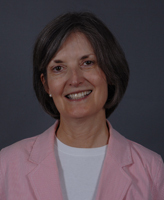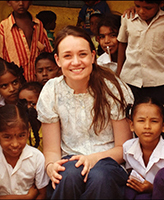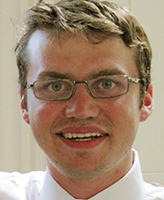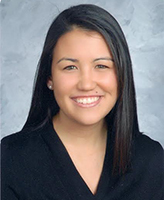 Ann Marie Power
Ann Marie Power
What would make a patient withhold information from his or her doctor? How do class, race, and ethnicity affect the quality of health care a patient receives? What social factors help determine the illnesses we contract and the best treatment plan for them?
A growing number of Notre Dame students who pursue a career in medicine are finding the answers to these questions through a combination of sociology and Arts and Letters Pre-Health coursework.
“I’m always happy when a pre-med student comes in and says he or she wants to major in sociology,” says Ann Marie Power, director of undergraduate studies in the Department of Sociology, “because so much of our physical, mental, and spiritual well-being has to do with who is around us, who is supporting us, and what resources we have.
“These students will become culturally responsive physicians who understand society and the mechanisms within it, the social determinants of health, and the effects of adverse experiences, such as poverty.”
An Invaluable Experience
Senior Kate Spencer, a sociology and pre-health major, plans to attend Tufts University School of Medicine this fall. She says her sociology major not only strengthened her medical school application, but will also make her a better doctor in the end.
 Kate Spencer in India
Kate Spencer in India
“We can no longer look at medicine from a purely biological perspective,” Spencer says. “I think it’s incredibly important that doctors are not just prescribing and treating symptoms, but healing and looking at the patient as an individual with a family, a background, and an upbringing that might be really different than theirs.”
While at Notre Dame, Spencer supplemented her coursework with a variety of internship opportunities, including two summers in India where she worked with several nongovernmental organizations (NGOs) and completed rotations in urban and rural hospitals.
Through a Department of Sociology course led by Power, Spencer has also interned at the local Center for Hospice during her junior and senior years. There, she conducts interviews with patients and creates books of their life stories for their families.
“It has been such an honor to give that presence to a patient and say, ‘I really care; please tell me about your life.’ It has taught me so much about patient communication skills.”
All of the internships have been invaluable, she says. “I have learned so much about patient care that you don’t learn in medical school and you’re not expected to know as a new doctor. Most med students haven’t had this much patient care experience, so I think that will give me a leg up in my clinical years as well.”
An Underlying Connection
 Christopher Knoedler, Jr. ’11
Christopher Knoedler, Jr. ’11
Excellent analytical and communications skills, broad exposure to literature and cultures, and a deeper understanding of human behavior are all part of what makes a liberal arts student stand out when applying to medical school, says Christopher Knoedler, Jr. ’11. Knoedler, who majored in sociology and Arts and Letters Pre-Health, is a second-year medical student at Tulane University School of Medicine, where he is also pursuing a master’s in public health.
“Medical schools are looking for well-rounded applicants,” he says. “A degree in sociology demonstrates that an applicant has been able to succeed in a field outside of the hard sciences.”
Brianna Aoyama ’12, a second-year medical student at the University of Connecticut School of Medicine, agrees—and says she “relished the opportunity” to combine a sociology major with science courses in the Arts and Letters Pre-Health program.
“I will spend the rest of my life studying and practicing medicine. So, looking back now, I am very glad that I spent my college years immersed in another field—especially one that gave me so many skills I use in medical school.
 Brianna Aoyama ’12
Brianna Aoyama ’12
“I am very comfortable writing papers and expressing myself through narrative. And my research skills are drastically improved as a direct result of a research methods class taught by (Assistant Professor) Mark Gunty.”
During her senior year, Aoyama wrote an honors thesis on the redefinition of self-identity in diabetic patients as a result of lower-leg amputation. She says she appreciated the chance to merge her interests in sociology and medicine, and explore the fundamental, underlying connection between the two disciplines.
“I think my undergraduate education gave me a certain ‘liberal arts perspective’ that influences the way I interact with and treat patients. I am always one of the first in my class to consider all the other non-medical reasons that my patient may be sick.”
A Different Kind of Physician

The medical profession as a whole, Power notes, is increasingly recognizing the value of sociology and psychology in educating physicians. In fact, the 2015 Medical College Admission Test (MCAT) will have a new section on the social and behavioral sciences and a new section on critical analysis and reasoning—competencies that are nurtured especially well in the College of Arts and Letters.
In an open letter announcing the changes, Dr. Darrell Kirch, president of the Association of American Medical Colleges, said that the health system of tomorrow will require “a different kind of physician,” who is focused more on promoting prevention and wellness, and is more culturally competent.
“Testing students’ understanding of these areas is important,” Kirch wrote, “because being a good physician is about more than scientific knowledge. It is about understanding people—how they think, interact, and make decisions.”
Spencer, who had the opportunity to take an experimental version of the new MCAT this year, says her sociology coursework was “extremely relevant” to the new test and to the process of applying to medical schools.
“Taking these classes has given me so much to talk about in my interviews,” she says. “For some of the interviews, you are given a scenario on the spot and asked to discuss it. Many of the scenarios were related to health care policy, ethics, and topics I studied as a sociology major. I was able to articulate what I think and back myself up with facts.”
In her interviews, Spencer also discussed why she majored in sociology. “I wanted a more comprehensive education and I wanted to look at medicine from a broader perspective,” she says.
“Even outside of medicine, I think it’s just made me a much more well-rounded person.”


